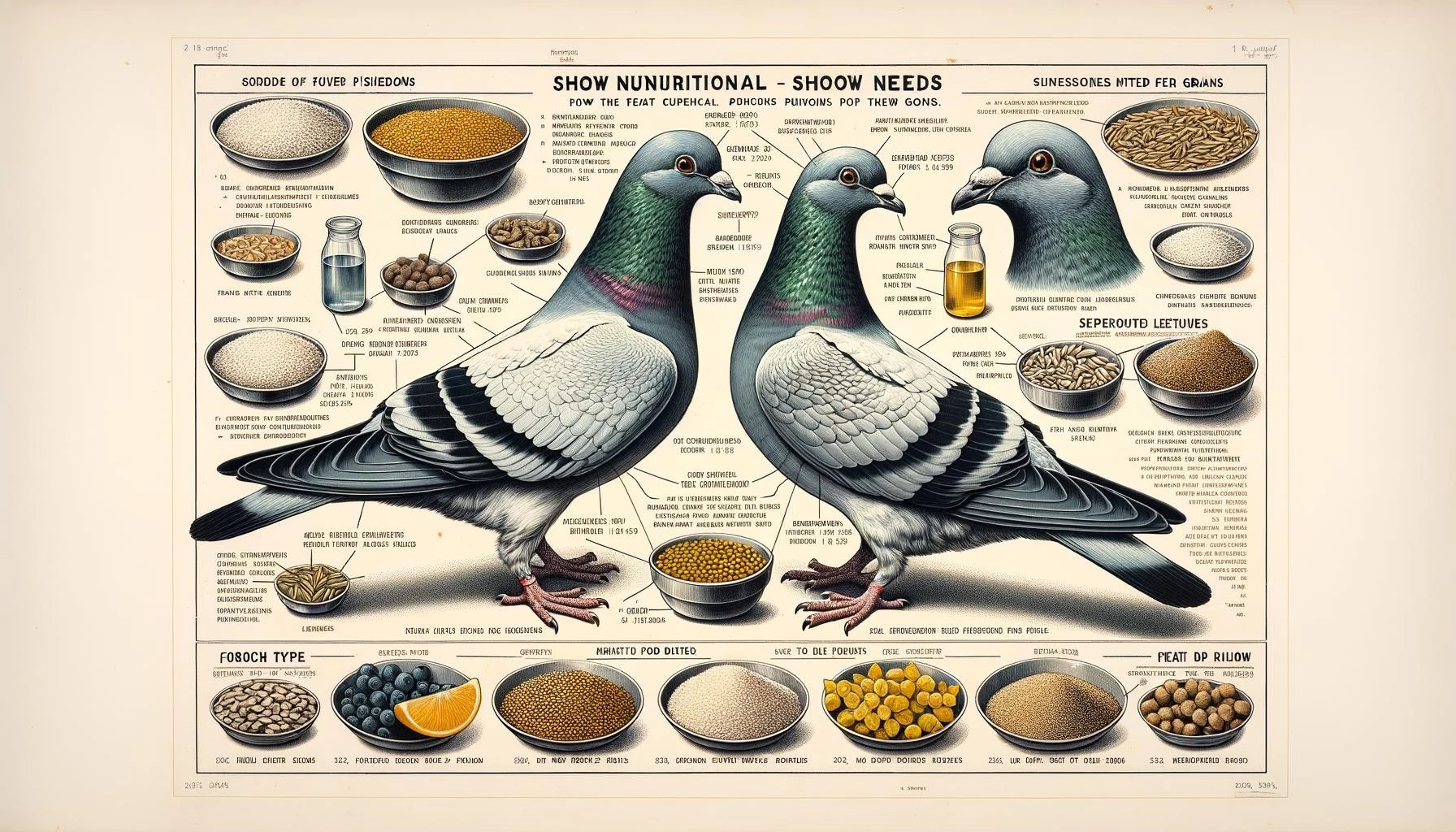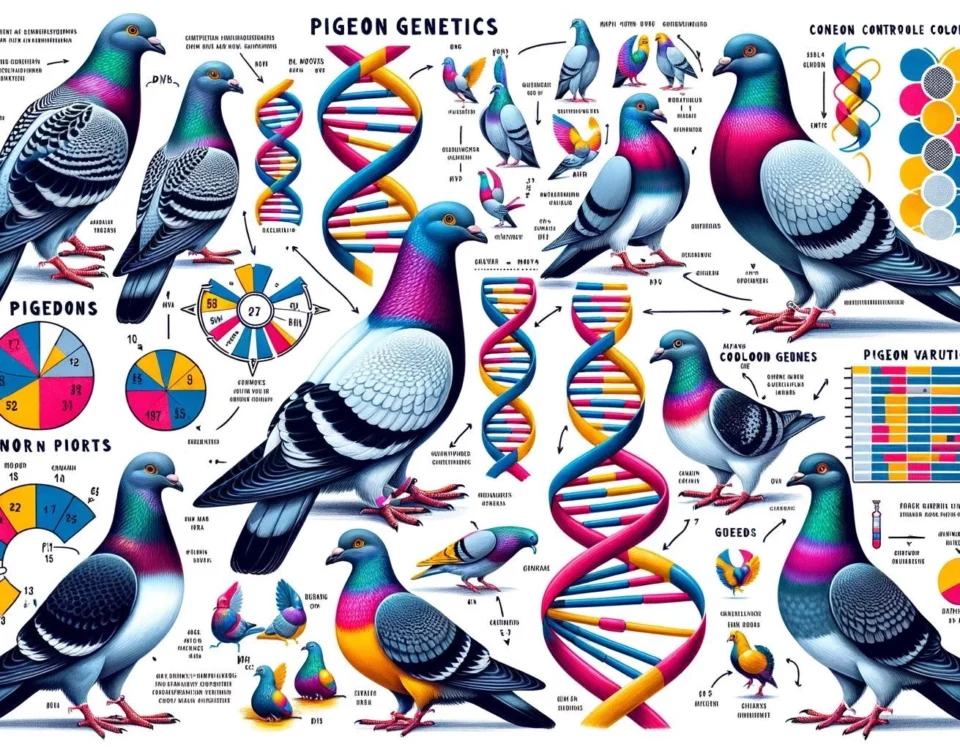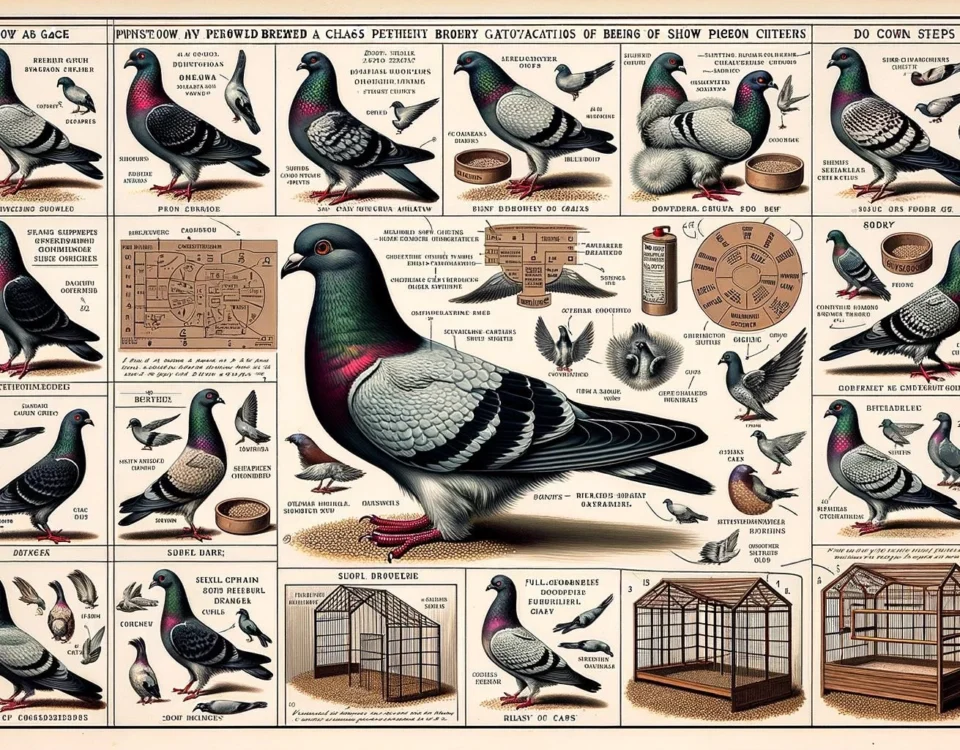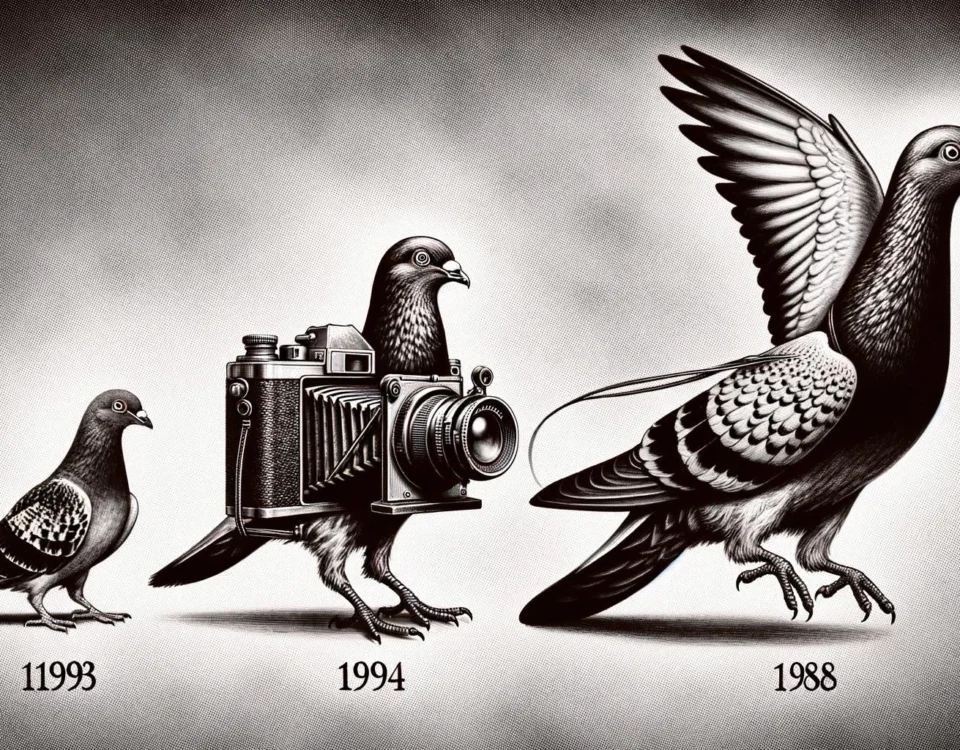Understanding the Diet of Show Pigeons
The diet of show pigeons is centered around a high-quality mixture of seeds and grains that provide the vital nutrients and energy necessary for their thriving. In addition to this, pigeons require two kinds of grit: soluble options like oyster shells and insoluble types such as granite. These are essential for grinding food effectively, aiding in proper digestion.
Fresh vegetables also play a significant role in their nutrition. Leafy greens, carrots, and peas are fantastic options that can be offered multiple times a week to enhance their intake of vitamins and minerals. Fruits, such as berries or melon, can be given as occasional treats but should be limited due to their natural sugar content. Other healthy snacks include:
- unsalted peanuts,
- millet sprays,
- cooked legumes.
Nonetheless, moderation is key when introducing these treats to maintain a balanced diet.
Providing clean water is crucial. Fresh water daily helps keep them hydrated and supports digestion and overall health.
Combining a nutrient-rich grain mix with fresh produce, limited treats, constant access to clean water, and the right type of grit allows you to meet the dietary needs of show pigeons successfully.
Importance of a Tailored Diet
A well-planned diet is vital for the well-being of show pigeons. It greatly influences their health, stamina, and performance in competitions. Giving them the right nutrition helps keep them in top physical shape and enhances their overall wellness.
- decreases the chances of health problems,
- boosts feather quality,
- increases stamina,
- enhances energy levels.
By adjusting their feeding routine to cater to specific needs, owners can help these pigeons excel and thrive.
Role of Diet in Health, Performance, and Vitality
The right diet is essential for the health, vitality, and performance of show pigeons. Proper nutrition ensures they receive the nutrients necessary to remain in peak condition and maintain energy levels. A balanced diet helps prevent deficiencies that could lead to illness or poor performance while promoting overall well-being.
Apart from supporting general health, a good diet enhances feather quality, giving show pigeons the polished look needed for exhibitions. It also boosts their stamina and energy, which are vital for active displays and successful breeding. Adjusting their diet based on different life stages or specific goals—such as breeding or competitions—ensures their unique nutritional needs are effectively met.
With a thoughtfully crafted feeding plan, pigeons can thrive in competitions and throughout their lives, maintaining robust health while performing at their best.
Key Nutritional Components for Show Pigeons
A balanced diet is crucial for keeping show pigeons healthy and performing at their best. Their nutrition revolves around three core components: carbohydrates, proteins, and fats.
- Carbohydrates act as the primary energy source for daily activities and competitions, typically sourced from grains such as corn, wheat, and barley.
- Proteins are vital for muscle development and feather strength, with legumes like peas and lentils providing essential nutrients.
- Fats contribute to overall health and offer sustained energy, with sunflower seeds being a popular choice.
Equally important are vitamins and minerals that support various body functions. For example:
- Vitamins A, D, E, and those in the B-complex group promote healthy skin, strong bones, vibrant feathers, and efficient metabolism.
- Calcium strengthens bones and ensures durable eggshells for breeding birds.
- Phosphorus aids in energy production.
- Trace minerals like zinc bolster the immune system’s effectiveness.
Hydration is equally critical; water keeps pigeons hydrated and supports digestion. Including fresh vegetables like leafy greens or carrots provides additional vitamins while adding variety to their meals. By consistently offering these key nutrients alongside proper hydration, show pigeons remain lively, energetic, and well-prepared for competitions or breeding seasons.
Carbohydrates, Proteins, and Fats
Show pigeons thrive on a diet rich in carbohydrates, proteins, and fats.
- Carbohydrates serve as their primary energy source, fueling both daily activities and competitions.
- Proteins are essential for muscle development and feather strength, making foods like peas and lentils valuable additions to their meals.
- Fats support overall health while providing sustained energy; sunflower seeds are a common favorite.
A well-balanced combination of these nutrients keeps show pigeons vibrant, active, and ready for any challenge.
Essential Vitamins and Minerals
Vitamins and minerals are crucial for maintaining the health and performance of show pigeons. These nutrients play a fundamental role in enhancing immunity, fortifying bones, and ensuring overall wellness.
Some vitamins stand out for their significance:
- Vitamin A sharpens vision and promotes healthy skin.
- Vitamin D is critical for strengthening bones by improving calcium absorption.
- Vitamin E supports reproductive health.
- B-complex vitamins are essential for boosting energy levels.
Minerals are just as vital for pigeon health:
- Calcium ensures strong bones and robust eggshells in breeding birds.
- Phosphorus supports energy production.
- Trace elements like zinc enhance the immune system to help pigeons combat illnesses.
To encourage growth and longevity in your birds, aim for a well-rounded diet filled with essential nutrients. This can include:
- Grains,
- Legumes,
- Fresh vegetables like leafy greens or carrots,
- Occasional supplements when necessary.
Importance of Water and Fresh Produce
Fresh fruits and vegetables, along with clean water, are vital for keeping show pigeons healthy and thriving. Nutritious options like leafy greens, carrots, and peas are rich in essential vitamins and minerals. These nutrients not only boost energy but also improve feather condition and contribute to overall vitality. Furthermore, these foods offer a natural source of hydration.
- Leafy greens,
- Carrots,
- Peas.
Equally vital is access to fresh water. It helps prevent dehydration, supports digestion, and facilitates essential processes like nutrient absorption and temperature regulation. Replacing the water daily ensures it remains uncontaminated and safe for your birds, reducing the risk of illness.
By consistently providing a mix of wholesome produce and clean water, you can promote optimal health in your pigeons while ensuring they shine during competitions or breeding periods.
Components of a Comprehensive Nutrition Plan
A balanced nutrition plan for show pigeons revolves around three essential components to maintain their health, vitality, and performance:
- Grain mixtures composed of easily digestible options,
- Pelleted diets or maintenance pellets,
- Supplements such as probiotics and digestive enzymes.
Grain mixtures not only provide consistent energy but also aid in nutrient absorption. Popular choices include millet, barley, and wheat.
Pelleted diets or maintenance pellets offer a carefully balanced combination of proteins, fats, vitamins, and minerals in precise proportions. These simplify feeding routines while ensuring the birds meet their daily dietary requirements without hassle.
Supplements such as probiotics and digestive enzymes can significantly enhance gut health. These additions optimize digestion and improve nutrient absorption, which becomes especially valuable during breeding periods or competitive events. By integrating these elements into one cohesive strategy, you’ll ensure your show pigeons remain healthy and thrive through every stage of life or performance demand.
Grain Blends and Easy-to-Digest Grains
Grain blends are crucial in the diet of show pigeons, supplying the vital macronutrients needed for their health and peak performance. The most effective mixtures include seeds such as millet, barley, and wheat. These grains provide an optimal nutritional balance—13-15% protein, 2.5-5% fat, and 2.5-6% fiber—while being nutrient-rich and easy to digest, offering maximum energy output.
While corn is often included as a low-cost filler in some feed mixes, it’s generally best to avoid it since pigeons tend to leave it uneaten. Choosing premium grain blends specifically formulated for pigeons ensures they receive consistent nutrition without unnecessary waste.
Grains that are easy to digest play a critical role in improving nutrient absorption and overall digestion, especially during demanding periods like competitions or breeding seasons. By prioritizing such grains in their diet, owners can help maintain their pigeons’ vitality while minimizing digestive stress.
Pelleted Diets and Maintenance Pellets
Pelleted diets are designed to ensure show pigeons receive a well-rounded mix of essential nutrients. Each portion contains proteins, fats, carbohydrates, vitamins, and minerals, removing the need for additional supplements. These diets provide consistent and complete nutrition, making feeding routines easier while supporting overall well-being.
Maintenance pellets play a vital role for pigeons that aren’t actively breeding or performing. They cater to daily nutritional requirements by maintaining energy levels, promoting healthy feathers, and strengthening immunity—without overloading on unnecessary nutrients. This makes them especially beneficial during quieter seasons or periods of reduced activity.
- Incorporating pelleted diets with grain blends and fresh produce,
- Keeping show pigeons thriving,
- Ensuring vitality at every stage of their lives.
Supplements, Probiotics, and Digestive Enzymes
Supplements, probiotics, and digestive enzymes are essential for enhancing the health and performance of show pigeons. Supplements deliver crucial nutrients like vitamins, minerals, and amino acids that may not be adequately provided by a grain-based diet. Incorporating a fortified pellet or a high-quality multivitamin blend ensures these birds receive the balanced nutrition they need.
Probiotics support gut health by fostering beneficial bacteria. They aid in digestion, boost nutrient absorption, and strengthen the immune system—benefits that are particularly valuable during demanding periods such as competitions or breeding seasons.
Digestive enzymes are vital for breaking down proteins, carbohydrates, and fats into simpler forms that are easier to absorb. By improving digestion efficiency, they help minimize waste and reduce the risk of digestive issues.
- Support their energy levels,
- Enhance vitality,
- Maintain overall wellness through various stages of life or challenges they face.
Specific Feeding Requirements Based on Pigeon Types
Feeding pigeons properly involves understanding their specific types and dietary needs. For instance, pigeons with short beaks thrive on soft, easily digestible food, as tougher grains can be difficult for them. Active breeds like high flyers and tumblers require energy-dense meals packed with high-calorie seeds such as sunflower or safflower to sustain their vigorous activity levels. Meanwhile, breeding pigeons need diets rich in protein—around 15-20%—to support egg production and ensure healthy chick development.
Performance pigeons have distinct nutritional demands. Their meals should include a balanced combination of carbohydrates for energy, along with proteins and fats to maintain endurance and peak condition. This is especially crucial during races or demanding training sessions. By tailoring the diet to suit each pigeon’s needs, you can help them stay healthy, energetic, and well-prepared to tackle various challenges effectively.
Short-beaked Pigeons and Their Nutritional Needs
Short-beaked pigeons thrive on a diet tailored to their unique beak structure, focusing on small, easily digestible grains. Ideal choices include:
- White and red sorghum,
- Vetch halves,
- Peas (both green and regular),
- Sunflower seeds,
- Rape,
- Buckwheat,
- Millet,
- Safflower.
These nutrient-rich grains are easy for them to consume and support their growth and overall health throughout the year.
High Fliers and Tumblers: Energy-Rich Mixtures
Pigeons known for their acrobatics and high-energy flights require specific diets to match their active lifestyles. Energy-packed seeds, such as sunflower and safflower, are excellent choices, offering sustained fuel for their prolonged activity.
While fats play a key role, protein is equally important in moderate amounts. Foods like peas and lentils provide the necessary protein to maintain strong muscles and aid recovery after intense exertion.
For an extra boost, carbohydrates from grains like millet or wheat are vital. This well-rounded mix of nutrients ensures these dynamic birds remain healthy, energetic, and prepared for their demanding routines.
Breeding Birds: Increased Protein Levels
Breeding pigeons require a higher protein intake to facilitate egg production and ensure their chicks grow strong and healthy. During this time, a diet containing 15-20% protein is considered optimal. Protein-rich foods are excellent choices to meet these nutritional demands, such as:
- Peas,
- Lentils,
- Soybeans.
This enhanced diet not only boosts reproductive success but also promotes the proper growth of young birds. Ensuring sufficient protein allows these pigeons to stay energetic and well-prepared to handle the demands of breeding with ease.
Performance Birds: Balancing Energy and Nutrition
Performance birds, such as racing pigeons, need a well-balanced diet that meets both their energy requirements and nutritional needs. To fuel their activities effectively, carbohydrates should make up the bulk of their diet, primarily sourced from grains like corn, wheat, and barley. These grains provide quick bursts of energy essential for peak performance.
Proteins are equally important, as they assist with muscle repair and help maintain endurance during rigorous training or competitive events. Foods such as peas and lentils provide excellent protein content to support these needs. Additionally, fats serve as a steady energy source for prolonged efforts, with sunflower seeds being an ideal example.
Vitamins and minerals play a crucial role in enhancing stamina and promoting overall health. For instance:
- B-complex vitamins improve metabolism,
- Calcium strengthens bones under physical stress,
- Clean water is vital for proper hydration and efficient nutrient absorption.
Customizing their diet to match activity levels ensures they stay energized without overburdening their digestion or risking unnecessary weight gain.
Feeding Strategies for Show Pigeons
To ensure pigeons perform at their peak, it’s important to align their diet with their energy needs and activity levels. Providing a high-energy meal plan becomes especially crucial during demanding times like exhibition season.
- Grains such as barley, millet, and wheat deliver sustained energy for their increased activity,
- Protein-rich foods like peas and lentils contribute to healthier feathers and stronger muscles,
- Sunflower seeds supply fats for enduring stamina.
Maintaining a regular feeding routine is key to supporting your birds’ overall health and performance. Fresh water should always be available to prevent dehydration and aid in digestion. As exhibitions approach, incorporating small portions of fresh vegetables—like carrots or leafy greens—can provide additional vitamins and minerals to boost vitality.
Monitoring food consumption is just as important:
- Ensure pigeons receive adequate nutrition without overindulging, which could lead to weight issues or digestive troubles,
- Clean food and water containers daily to minimize contamination risks.
By following these steps, your show pigeons will remain healthy, lively, and ready to impress in competitions.
Feeding Guidelines During Exhibition Season
During exhibition season, adjusting a pigeon’s diet to suit their heightened activity is essential. Providing them with high-energy meals ensures they perform at their peak.
- Grains like barley, millet, and wheat deliver sustained energy,
- Protein-packed foods such as peas and lentils help build strong muscles and enhance feather quality,
- Sunflower seeds offer the healthy fats needed to maintain stamina.
Incorporating fresh veggies, such as leafy greens or carrots, adds important vitamins and minerals that boost overall vitality. It’s equally important to provide constant access to clean water—this not only prevents dehydration but also aids digestion. Monitoring their food portions is key since overfeeding can lead to weight gain or digestive issues.
Maintaining a consistent feeding schedule during this period is just as critical. To reduce contamination risks and keep show pigeons in top form all season long, make sure to clean their food and water containers daily.
Adjusting Diets for Breeding Periods
Modifying the diet of show pigeons during breeding season is crucial to meet their increased nutritional needs. Protein plays a key role during this period, aiding in egg production and ensuring the healthy development of chicks. It’s recommended to aim for a diet with 15-20% protein content.
Incorporating foods such as:
- Peas,
- Lentils,
- Soybeans.
These can provide excellent sources of protein. This not only improves reproductive performance but also contributes to the birds’ overall vitality and energy during this challenging stage. By adjusting their feed accordingly, breeders can foster stronger, healthier pigeons and achieve more successful breeding results.
Managing Nutrient Deficiencies
Caring for show pigeons and managing their nutrient needs requires thoughtful attention. Providing a diverse diet that combines grains, seeds, and appropriate supplements is essential for addressing their unique nutritional requirements. Enriched feeds or multivitamin mixtures can effectively bridge any gaps in vital nutrients.
Regularly assessing their food intake is crucial to catching deficiencies before they escalate. Adding grit, such as crushed oyster shells or small granite particles, supports digestion by breaking down food efficiently, enhancing nutrient absorption. Including fresh vegetables like leafy greens or carrots can further enrich their vitamin intake.
- Grains,
- Seeds,
- Appropriate supplements.
If your pigeons start to show signs of nutrient imbalances—like dull plumage or reduced stamina—it’s important to make dietary changes promptly. Consulting an avian nutritionist or veterinarian can offer tailored guidance to restore their health and keep them thriving.
Common Health Problems and Dietary Solutions
Good nutrition is essential for keeping show pigeons healthy and preventing common health issues. Many problems arise from dietary imbalances or a lack of vital nutrients. To keep them in top shape, it’s crucial to offer a mix of nutrient-rich grains, fresh vegetables, and quality supplements. This combination helps prevent issues like weak feathers and lethargy. Important vitamins—like A, D, and B-complex—play a significant role in maintaining vibrant skin, sturdy bones, and efficient metabolism.
Digestive health shouldn’t be overlooked either. Pigeons benefit greatly from both types of grit:
- Soluble ones like oyster shells,
- Insoluble options such as granite.
These aids help break down food effectively while improving nutrient absorption. Always ensure clean water is available since proper hydration is crucial for digestion as well as overall health.
Adapting their diet to address specific needs can also promote faster recovery and alleviate symptoms. For example:
- Calcium-rich foods are excellent for strengthening bones in cases of deficiency,
- Protein-packed options like peas can support muscle growth during stress or illness.
Preventing Nutrient Deficiencies
Providing a balanced diet tailored to the needs of show pigeons is key to preventing nutrient deficiencies. A carefully chosen mix of grains and seeds—such as millet, barley, and safflower—offers essential carbohydrates for energy, proteins to support muscle development and feather health, and fats for sustained vitality.
- Adding fresh vegetables like leafy greens or carrots enhances their vitamin intake,
- Vitamins A and B-complex are particularly crucial for maintaining healthy skin and supporting efficient metabolism,
- Minerals, especially calcium, play a vital role in strengthening bones and ensuring robust eggshells in breeding birds.
To fill any nutritional gaps while maintaining consistency in their meals, high-quality supplements or pelleted feeds can be highly effective. Monitoring your pigeons’ overall health—observing their feather condition, energy levels, or activity—can help you identify potential deficiencies early on. If you spot issues like dull plumage or reduced stamina, adjusting their diet promptly or seeking advice from an avian nutritionist can make a significant difference.
Fresh water is indispensable—not only for good digestion but also for proper nutrient absorption and preventing dehydration. Including grit in their diet further aids digestion by breaking down food efficiently and enhancing nutrient uptake. By combining these dietary strategies with regular evaluations of their nutritional needs, show pigeons can stay in peak condition and perform at their best year-round.
Supporting Digestive Health with Grit
Grit is essential for keeping show pigeons’ digestive systems healthy. Since these birds lack teeth, they rely on their gizzards to break down food effectively. This process is aided by grit, which comes in two forms:
- Soluble options like oyster shells,
- Insoluble ones such as granite.
- Together, these help grind food into smaller pieces, ensuring nutrients are absorbed efficiently—key to maintaining energy and overall well-being.
In addition to aiding digestion, soluble grit provides calcium that strengthens bones and enhances the quality of eggshells in breeding pigeons. Conversely, insoluble grit remains in the gizzard longer, continuing to crush tougher grains and seeds over time. By providing pigeons with consistent access to high-quality grit, you not only enhance their digestion but also promote better nutrient absorption and sustained energy at every life stage.
Feeding Decisions for Optimal Pigeon Care
Feeding pigeons involves considering their age, activity level, and overall health to ensure they receive the right nutrients. Different life stages and activities demand specific dietary adjustments. For example, young pigeons need protein-rich food to fuel their growth, while breeding pigeons benefit from diets with extra calcium to support egg production and strengthen their bones.
It’s important to regularly check a pigeon’s body condition to maintain appropriate feeding habits.
- Overloading on grains can lead to obesity,
- Insufficient protein might result in dull feathers and low energy levels,
- Including fresh vegetables like leafy greens or carrots adds essential vitamins without unnecessary calories.
Providing clean water is just as vital—it keeps them hydrated and aids digestion.
Achieving a proper balance between calcium and phosphorus is critical for strong bones and sturdy eggshells since imbalances can cause weakness over time. Fresh produce contributes trace minerals that further support these needs. Additionally, adjusting their diet according to seasonal changes—like offering higher-calorie foods during colder months—helps keep pigeons healthy throughout the year.
Understanding Energy Requirements
Energy requirements for show pigeons depend on their activity levels and life stages. Birds actively involved in competitions or exhibitions need higher energy intake to sustain their performance, while less active ones benefit from a balanced diet with moderate energy to avoid weight gain. Young pigeons in the growth phase thrive on diets rich in carbohydrates and proteins, which fuel their development.
Tailoring a pigeon’s diet based on these needs is key to ensuring good health and vitality. For instance:
- Grains like corn and barley deliver essential carbohydrates for energy,
- Protein-rich foods such as peas or lentils help build muscle and strengthen feathers,
- Fats from sunflower seeds offer sustained energy, particularly during periods of intense activity.
Diet adjustments are especially important during breeding or molting seasons when the birds require more nutrients for egg production or feather regeneration. Monitoring a pigeon’s body condition helps maintain the right balance between feeding enough and avoiding overfeeding. Additionally, always ensure they have access to clean water to aid digestion and nutrient absorption efficiently.
Balancing Calcium and Phosphorus Ratios
Ensuring the right balance of calcium and phosphorus is essential for pigeons’ bone strength and overall health. These two minerals complement each other—calcium fortifies bones, while phosphorus supports energy generation and metabolic processes. The ideal proportion is a 2:1 ratio of calcium to phosphorus.
Maintaining this equilibrium allows for effective mineral absorption, reducing issues like brittle bones or fragile eggshells in breeding pigeons. Offering calcium-rich options like oyster shells alongside phosphorus sources such as wheat or legumes helps sustain this balance, contributing to their vitality and well-being.
Incorporating Fresh Food and Water
Including fresh food and water in a show pigeon’s diet is crucial for maintaining their health and vitality.
- Leafy greens,
- Carrots,
- Peas.
These are excellent choices, packed with essential vitamins and minerals. These nutrients not only boost energy but also enhance feather quality and fortify the immune system. Providing these vegetables a few times a week can significantly improve their overall well-being.
Equally critical is access to clean water. Proper hydration supports digestion, helps absorb nutrients effectively, and keeps body temperature in check. Refreshing their water daily minimizes the risk of contamination, ensuring they stay healthy. By combining nutritious produce with consistently fresh water, you can create a balanced diet that helps your show pigeons flourish.








